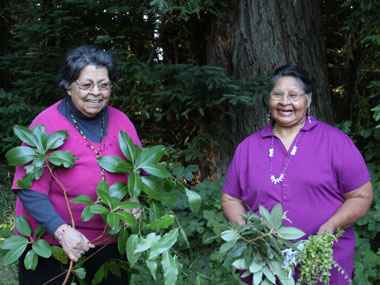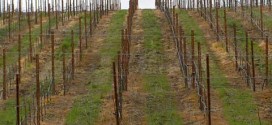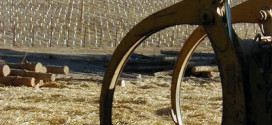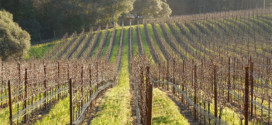Codorníu defends their project, and
Friends of the Gualala River responds
On December 21, 2011, following a tidal wave of negative publicity (over 125,000 signatures on petitions in the USA and Spain opposing their project), Codorníu issues a statement defending their project (see below), and Friends of the Gualala River responds.
Deforestation in Annapolis
It’s nice that Codorníu plans to preserve “two old Redwood trees,” but the issues which motivated over 125,000 people to sign petitions against their plan is the destruction of redwood forests (los bosques de secuoyas) and Native American heritage.
The 154 acres (62 hectares) of forest that Codorníu plans to destroy contains thousands of tall (80+ feet / 25+ meters) second-growth redwood trees.
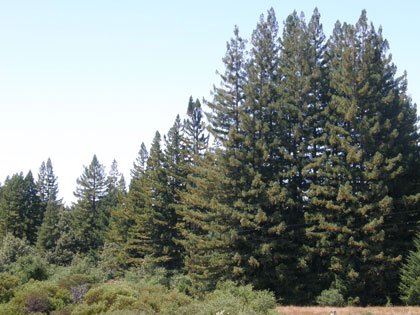
Redwood forest on the Artesa Annapolis property
A forest is much more than just trees. There are hundreds of species of plants, mammals, birds, amphibians, insects and fungi living in the forest. After Codorníu cuts down all the trees, they will pull out the roots, deep rip the soil, apply pesticides, herbicides and tons of lime and surround it with fencing to keep wildlife out. There will be nothing left except soil – ready for a monoculture of grapes.
Precious rainfall will be shunted to rubber lined reservoirs for vine irrigation. The vast majority of the balance will quickly run off the denuded former forestland, unavailable to slowly percolate down through intact forest soils to the river to supply summer flows for the endangered fish in the river.
Codorníu said, “…the first draft of its environmental impact report states that the Annapolis project has no [in]significant impact on the natural environment.” Of course it does! Big corporations like Codorníu can always find scientists for hire who are willing to say that their project will have no environmental impact.
Independent experts have found serious problems with the draft environmental impact report (see GualalaRiver.org for their critical comments) that we believe would reverse any approval of this project, when this flawed report is inevitably challenged in the courts.
Ask yourself, do you believe that there would be no environmental impacts from destroying a large redwood forest?
This land also holds great spiritual and cultural significance to a tribe of Native Americans, the Kashia Pomo, who regard it as a blessed place where their ancestors lived.
|
– Violet Parrish Chappell and Vivian Parrish Wilder |
There are other places in Sonoma County where Codorníu could plant grapes without destroying redwood forest or Native American heritage. Wouldn’t choosing an alternative site that requires no deforestation be the right thing to do?
Codorníu, you have the resources and, as you say, “a firm commitment to the environment” in Spain. Now do the right thing on the other side of the Earth.
Codorníu’s statement
in English, Spanish & Catalan
From: <codinfo@codorniu.com>
Date: 2011/12/21
Subject: Proyecto de Artesa en Annapolis (Sonoma-California) Artesa Annapolis Wineyard Proyect in Sonoma (California)
English
Dear Sir or Madam:
We have received your e-mail about the Artesa Annapolis wineyard project in Sonoma (CA).
First of all, we would like to thank you for your interest in this project and to explain the steps that we have made on this issue over the last 12 years.
Twelve years ago, in 1999, the Artesa winery in Napa – owned by Codorníu – bought 320 acres of land to plant vineyards in the Annapolis area (Sonoma), famous for being one of the country’s most prestigious wine-making areas.
The trees on this land had been cut down 40 to 60 years ago by the former owners who cleared the land for grazing and planted apple trees. Some of the younger trees are still standing as well as two old Redwood trees which Artesa is going to preserve.
Artesa intends to plant vineyards on around 50% of the property and preserve the rest of the land as it is in its current state.
The project is backed by rigorous environmental impact studies in progress for the past 6 years. Archeology, hydrology, biology and environmental engineering experts, proposed by the US Federal administration, has been carrying out studies over various years in order to ensure the project would have a minimum impact on the environment. These studies have been endorsed by the State of California, which in the first draft of its environmental impact report states that the Annapolis project has no insignificant impact on the natural environment.
Other government agencies such as CalFire, the Department of Fish & Game and the U.S. Army Corps of Engineers have visited the property on various occasions to study the project and the environment conservation measures adopted by Artesa prior to giving the go ahead for the planting of vineyards.
During these years of in situ studies, the state agencies have checked to make sure that no species of flora or fauna will be adversely affected by the Artesa project.
There is also a creek which runs through the property, called Patchett Creek, and the agencies have checked that there are no fish species which need special protection. Even so, the Artesa project plans to protect the entire stretch of Patchett Creek that runs through the property adopting the measures prescribed by the auditing bodies.
Throughout its history, Codorníu has always shown a firm commitment to the land and its natural surroundings and this link with the land and the environment is the foundation stone of all its activity.
Español
Estimados Sr/Sra:
Hemos recibido su e-mail referente al proyecto de Artesa (bodega perteneciente a Codorníu) sobre la plantación de un viñedo en Annapolis (Sonoma- California).
Antes que nada queremos agradecerle su interés por este asunto y exponerle todo los pasos que sobre el mismo se han dado en los últimos años.
Hace 12 años en 1999 la bodega Artesa en Napa -propiedad de Codorníu- adquirió 130 ha de terreno para plantar viñedos en la zona de Annapolis (Sonoma), famosa por ser una de las zonas vitivinícolas más prestigiosas del país.
Los árboles existentes en estos terrenos habían sido talados entre 40 y 60 años antes por sus antiguos propietarios para dedicarlos a pastoreo y plantación de algunos árboles frutales, concretamente manzanos. Quedan en pie algunos de estos árboles jóvenes, además se han detectado dos viejos ejemplares de una especie de árbol conocida en California como Redwood, que Artesa va a preservar.
Artesa prevé destinar alrededor del 50% del terreno a plantación de viñedo y el resto preservarlo en su estado actual, manteniéndolo así intacto.
El proyecto viene precedido por un riguroso estudio de impacto medioambiental que dura ya 6 años. Expertos en arqueología, hidrología, biología e ingeniería medioambiental, propuestos por la administración pública norteamericana, han realizado estudios durante varios años destinados a garantizar que el impacto sobre el entorno será mínimo. Estos estudios están avalados por el Estado de California que, en un primer borrador de su informe sobre impacto medioambiental certifica que el proyecto de Annapolis, tiene un impacto insignificante en el entorno natural.
Otras agencias gubernamentales como son CalFire, Depatment of Fish & Game, o U.S.Army Corps of Engineers, han visitado varias veces la propiedad para analizar el proyecto y las medidas de preservación del entorno puestas en marcha por Artesa, como medida previa a otorgar la autorización para la plantación de vides.
Las agencias estatales han verificado durante todos estos años de estudios in situ que no hay especies de flora o fauna que puedan ser afectadas por el proyecto de Artesa.
En la misma propiedad existe además un arroyo, llamado Patchett Creek, que la recorre en el que las agencias han corroborado que no hay, ni hubo, especies de peces que necesiten ser protegidas. A pesar de ello, el proyecto de Artesa contempla proteger el arroyo Patchett a lo largo de su extensión por el terreno de su propiedad con medidas garantizadas por los organismos auditores.
Codorníu siempre ha mostrado un firme compromiso con la tierra y el respeto al medioambiente a lo largo de toda su historia, y este vínculo con la tierra y el entorno, es pilar básico en toda su actividad.
Català
Estimat Sr/Sra:
Hem rebut el seu mail referent al projecte de la nostra bodega Artesa de plantar vinya a Annapolis (Sonoma-California).
Abans de res volíem agrair el seu interès per aquest projecte i explicar-li les passes que hem portat a terme.
Ara fa 12 anys, el 1999, el celler Artesa de Napa (propietat de Codorníu) va adquirir 130 ha de terrenys per plantar-hi vinyes a la zona d’Annapolis (Sonoma), famosa per ser una de les àrees vitivinícoles més prestigioses del país.
Els arbres existents en aquests terrenys van ser tallats arran de terra entre 40 i 60 anys abans pels seus antics propietaris, per dedicar-los a pastures i a plantar-hi alguns arbres fruiters, concretament pomeres. Encara queden dempeus alguns d’aquests arbres joves; a més, s’han detectat dos vells exemplars d’una espècie d’arbre coneguda a Califòrnia com a redwood, que Artesa té intenció de preservar.
Artesa preveu de destinar aproximadament el 50% dels terrenys a plantació de vinyes, i la resta mantenir-los intactes en el seu estat actual.
El projecte està precedit per un rigorós estudi d’impacte mediambiental que dura ja 6 anys. Experts en arqueologia, hidrologia, biologia i enginyeria mediambiental, proposats per l’administració pública nord-americana, han realitzat durant uns anys estudis destinats a assegurar que l’impacte sobre l’entorn sigui mínim. Aquests estudis estan avalats per l’estat de Califòrnia que, en un primer esborrany del seu informe sobre impacte mediambiental, certifica que el projecte d’Annapolis té un impacte insignificant en l’entorn natural.
Altres agències governamentals, com ara CalFire, el Department of Fish & Game o el U.S. Army Corps of Engineers, han visitat vàries vegades la propietat per analitzar el projecte i les mesures de preservació de l’entorn adoptades per Artesa, com a mesures prèvies a l’atorgament de l’autorització per a la plantació dels ceps.
Tots aquests anys d’estudis, les agències estatals han verificat in situ que no hi ha espècies de flora o fauna que puguin ser afectades pel projecte d’Artesa.
A la mateixa propietat hi ha a més un rec, anomenat Patchett Creek, que la recorre i en què les agències han corroborat que no hi ha, ni mai hi va haver, espècies de peixos que necessitin ser protegides. Tot i això, el projecte d’Artesa contempla protegir el rec al llarg del seu recorregut pels terrenys de la propietat, amb mesures garantides pels organismes auditors.
Codorníu ha mostrat un ferm compromís amb la terra i el respecte al medi ambient al llarg de tota la seva història, i aquest vincle amb la terra i l’entorn és un pilar bàsic en tota la seva activitat.
For additional information, see:
Artesa (“Fairfax”) vineyard conversion EIR CAL FIRE released the Final Environmental Impact Report (EIR) for Artesa Winery’s plan to clear-cut 154 acres of coastal redwood forest to plant a vineyard in Annapolis. The EIR states that the project will have no significant environmental or cultural impacts.
CAL FIRE released the Final Environmental Impact Report (EIR) for Artesa Winery’s plan to clear-cut 154 acres of coastal redwood forest to plant a vineyard in Annapolis. The EIR states that the project will have no significant environmental or cultural impacts.
 Artesa Vineyards & Winery
Artesa Vineyards & Winery
Artesa’s Facebook page has a description of their vineyard “conversion” project in Annapolis, but it doesn’t match what they say in their draft Environmental Impact Report.
Petition opposing destruction of redwood forests Please encourage our elected officials to help us stop Codorniu’s Artesa Napa Winery and Premier Pacific Vineyards from destroying coastal redwood forest and Native American heritage for financial gain. 90,000 signatures so far!
Please encourage our elected officials to help us stop Codorniu’s Artesa Napa Winery and Premier Pacific Vineyards from destroying coastal redwood forest and Native American heritage for financial gain. 90,000 signatures so far!
Read and sign the petition!
“Pídele a Codorníu que no destruya los bosques para producir sus vinos”  Ask Codorníu not to destroy forests to produce their wines
Ask Codorníu not to destroy forests to produce their wines
Over 40,000 people have signed a petition on Spanish website Actuable asking Codorníu [based in Spain] not to destroy redwood forest in Sonoma County to produce their wines. Read and sign the petition!
The Mendonoma Coast’s Second Spanish Invasion Spanish wine corporation Grupo Codorníu is accustomed to doing things in a big way. It is reputed to own a greater expanse of vineyard acreage than any wine company in Spain, which in turn has more land under grapevine cultivation than any nation in the world.
Spanish wine corporation Grupo Codorníu is accustomed to doing things in a big way. It is reputed to own a greater expanse of vineyard acreage than any wine company in Spain, which in turn has more land under grapevine cultivation than any nation in the world.
June, 2011, Anderson Valley Advertiser
Gualala vineyard conversions get national attention June, 2011: “Plan to cut forest for vineyards faces opposition”, an article by the Associated Press, appears in newspapers across the country, including the San Francisco Chronicle, Washington Post, Sacramento Bee, etc., as well as Salon, Huffington Post, Forbes and many others.
June, 2011: “Plan to cut forest for vineyards faces opposition”, an article by the Associated Press, appears in newspapers across the country, including the San Francisco Chronicle, Washington Post, Sacramento Bee, etc., as well as Salon, Huffington Post, Forbes and many others.
Coalition asks Spanish corporation to withdraw proposal to clear-cut coastal redwood forest for vineyards Friends of the Gualala River has joined with 18 national, California, and regional environmental organizations in asking the international wine corporation, Codorniu of Barcelona, Spain, to withdraw its controversial proposal to destroy nearly 150 acres of coastal redwood forest by clear-cutting and converting the area for new vineyards to produce premier wine grapes.
Friends of the Gualala River has joined with 18 national, California, and regional environmental organizations in asking the international wine corporation, Codorniu of Barcelona, Spain, to withdraw its controversial proposal to destroy nearly 150 acres of coastal redwood forest by clear-cutting and converting the area for new vineyards to produce premier wine grapes.
 Artesa (“Fairfax”) vineyard conversion
Artesa (“Fairfax”) vineyard conversion
CAL FIRE has released a Partially Recirculated Draft Environmental Impact Report, to address inadequacies in the Cultural Resources and Climate Change sections of the DEIR. Deadline for public comments is April 27, 2011.
 Pomo heritage threatened
Pomo heritage threatened
The Artesa vineyard project area is “very possibly the Kashaya Pomo village Kabatui” where “human remains may be present,” and which contains rich archaeological areas that are eligible for listing in the National Registry of Historic Places.
Pomo elders speak out about vineyards Where we used to live, no one can see anything now. It is time we open our mouths. Those vineyard people are interfering with our ancestors’ area…
Where we used to live, no one can see anything now. It is time we open our mouths. Those vineyard people are interfering with our ancestors’ area…
 Erasing Native American history?
Erasing Native American history?
As an early morning mist filters through the Redwoods in the village of Annapolis in NW Sonoma County, a Pomo elder of the Kashia band walks through the forest toward an ancient settlement site…
 Desecration of Pomo history
Desecration of Pomo history
A first step toward satisfying the responsibility for Europeans and their descendants in North America would be to treat indigenous people with respect.
 Friends of Gualala River Protecting the Gualala River watershed and the species living within it
Friends of Gualala River Protecting the Gualala River watershed and the species living within it
 “The idea that these sacred places could be fenced off is not good. We don’t go for that. You don’t have to dig it up.
“The idea that these sacred places could be fenced off is not good. We don’t go for that. You don’t have to dig it up.  We know that whole area is a village site. All these places were occupied and used by our people.”
We know that whole area is a village site. All these places were occupied and used by our people.” 